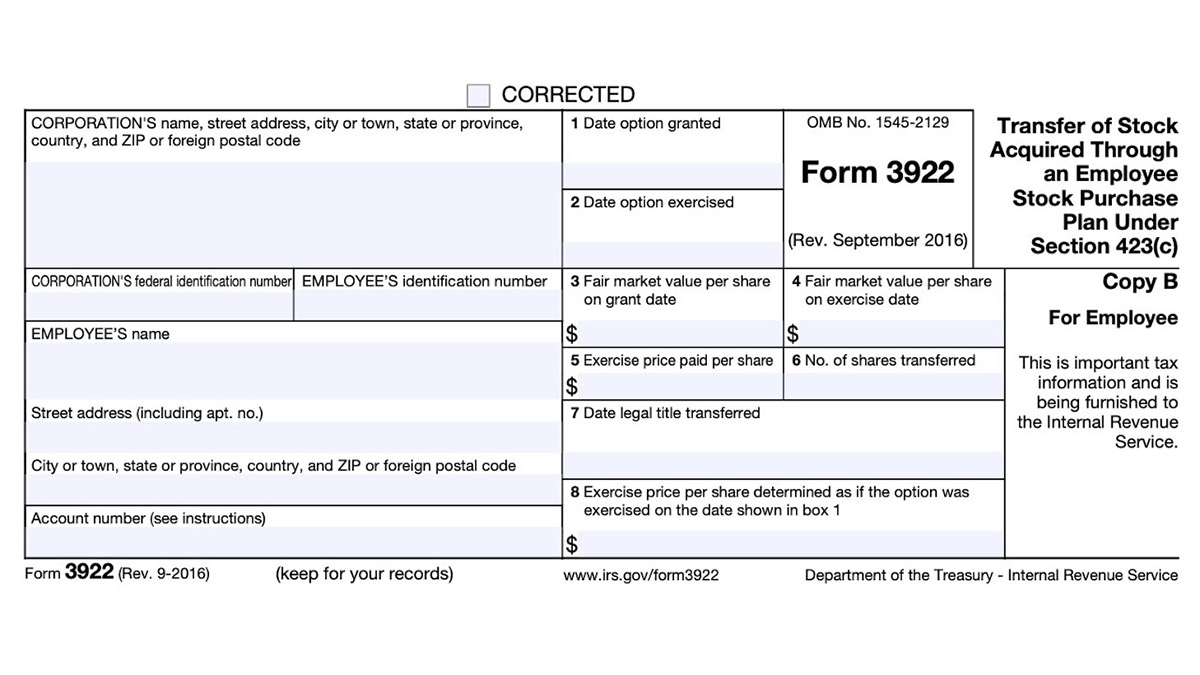

Finance
How To Report RSU On A Tax Return
Published: October 29, 2023
Learn how to report RSU on your tax return and maximize your finance. Expert tips and guidance to simplify the process and save you money.
(Many of the links in this article redirect to a specific reviewed product. Your purchase of these products through affiliate links helps to generate commission for LiveWell, at no extra cost. Learn more)
Table of Contents
- Introduction
- Understanding RSUs (Restricted Stock Units)
- Reporting RSUs on Form W-2
- Reporting RSUs on Form 1099-B
- Reporting RSUs on Schedule D
- Reporting RSUs on Form 8949
- Reporting RSUs on Form 1040
- Reporting RSUs on State Tax Return
- Reporting RSUs on Foreign Tax Return
- Special Considerations for RSUs
- Frequently Asked Questions
- Conclusion
Introduction
Welcome to the ultimate guide on how to report RSUs (Restricted Stock Units) on a tax return. RSUs are a popular form of equity compensation granted by companies to their employees. As an employee who receives RSUs, it is crucial to understand how these stock units are taxed and how to accurately report them on your tax return. By properly reporting RSUs, you can minimize the potential for errors, avoid penalties, and ensure compliance with tax regulations.
RSUs are commonly granted as part of an employee’s compensation package, particularly in the tech and finance industries. Unlike stock options, which give employees the right to purchase company stock at a specified price, RSUs represent actual shares of stock that are awarded to employees. However, these shares are subject to certain restrictions, such as vesting requirements or performance milestones that must be met before the employee gains full ownership of the stock.
When it comes to reporting RSUs on your tax return, it’s important to understand that there are multiple forms and schedules involved, depending on your specific circumstances. In this comprehensive guide, we will walk you through the various steps and forms required to accurately report RSUs on your tax return, including Forms W-2, 1099-B, and 8949, as well as Schedule D and Form 1040. We will also address specific considerations for reporting RSUs on state and foreign tax returns, along with some frequently asked questions.
Preparing your tax return can be a daunting task, especially when it involves reporting complex financial transactions like RSUs. However, by gaining a clear understanding of the reporting requirements and staying organized throughout the process, you can navigate the reporting process with ease. This guide will provide you with the knowledge and insights needed to confidently and accurately report your RSUs on your tax return.
Before we delve into the specifics of reporting RSUs, it’s important to note that while this guide provides general information, it may not cover all unique circumstances. Consulting a tax professional or referring to IRS guidelines is always recommended to ensure compliance with the latest regulations and to address specific tax concerns.
Understanding RSUs (Restricted Stock Units)
Restricted Stock Units (RSUs) are a type of compensation commonly used by companies to reward and incentivize their employees. Unlike stock options, which give employees the right to purchase company stock at a specific price, RSUs represent actual shares of stock that are granted to employees. However, these shares come with certain restrictions and conditions that must be met before the employee can fully own the stock.
When an employee is granted RSUs, they do not receive the actual stock immediately. Instead, the RSUs are subject to a vesting period, during which the employee must fulfill certain requirements, such as staying with the company for a specific period of time or achieving certain performance goals. Once the RSUs vest, the employee gains ownership of the corresponding number of shares of stock.
It’s important to note that until the RSUs vest, the employee does not have any voting rights or receive dividends on the stock. However, during the vesting period, the value of the RSUs can still fluctuate based on the company’s stock price. This means that the employee may experience gains or losses even before they officially own the stock.
Once the RSUs fully vest and the employee becomes the legal owner of the stock, they can choose to sell the shares or hold on to them for potential future gains. The decision to sell or hold the stock will have tax implications, which we will discuss in detail in the subsequent sections of this guide.
RSUs are often considered a valuable form of compensation, as they align the interests of the employee with those of the company. If the company performs well and the stock price increases, the employee stands to benefit from the appreciation in the value of their RSUs. On the other hand, if the company’s stock price declines, the employee may experience a loss in the value of their RSUs.
Understanding the basics of RSUs is crucial when it comes to reporting them on your tax return. The vesting, ownership, and eventual sale of RSUs can have varying tax consequences, and it’s important to accurately report these transactions to ensure compliance with tax laws and regulations.
Reporting RSUs on Form W-2
Form W-2 is the standard tax form used by employers to report employee wages and salaries to the Internal Revenue Service (IRS). If you received RSUs as part of your compensation package, your employer is responsible for reporting the value of the RSUs on your Form W-2.
When RSUs vest, the fair market value (FMV) of the shares on the vesting date is considered ordinary income and subject to federal income tax, as well as Social Security and Medicare taxes. Your employer will include the FMV of the vested RSUs in Box 1 of your Form W-2, labeled “Wages, tips, other compensation.” This amount should also be reported in Box 2, “Federal income tax withheld.”
It’s important to understand that the FMV reported on your Form W-2 is based on the stock price on the date the RSUs vested. This value may be different from the stock price at the time of grant or the actual sale of the shares. The FMV is used to determine your taxable income for the year.
In addition to reporting the FMV of vested RSUs, your employer may also include other information related to RSUs on your Form W-2. This may include the number of RSUs vested and any taxes withheld. This information is typically reported in Box 14 or in a separate section labeled “Supplemental Information.”
When you receive your Form W-2, carefully review the information related to your RSUs. Ensure that the FMV of the RSUs is accurately reported and that any taxes withheld are correctly reflected. If you have any concerns or discrepancies, reach out to your employer or tax advisor for clarification.
When it comes time to prepare your tax return, you will need to transfer the information from your Form W-2 to the appropriate sections of your tax forms. The FMV of vested RSUs reported on your Form W-2 will be included as part of your total wages and should be reported on Form 1040, Line 1, “Wages, salaries, tips, etc.”
Remember, reporting the RSUs on your Form W-2 correctly is essential to accurately calculate your tax liability and avoid any potential penalties or audits. If you’re unsure about how to report the information from your Form W-2, consult a tax professional for guidance.
Reporting RSUs on Form 1099-B
Form 1099-B is a tax form used to report the proceeds from the sale of stocks, bonds, mutual funds, and other securities. If you sold the RSUs that have vested, you may receive a Form 1099-B from your brokerage or the company’s stock plan administrator.
When you sell RSUs, it is considered a taxable event, and you must report the transaction on your tax return. The Form 1099-B will provide you with the necessary information to accurately report the sale of your RSUs. It will include details such as the date of sale, the number of shares sold, the proceeds from the sale, and any cost basis information.
It’s important to carefully review the information provided on your Form 1099-B for accuracy. Verify that the number of shares sold and the proceeds from the sale match your own records. Keep in mind that the cost basis information may or may not be included on the Form 1099-B. If it is not provided, you will need to determine the cost basis yourself.
The cost basis of RSUs is generally the fair market value (FMV) of the shares at the time they vested. This value should have been reported on your Form W-2. If the FMV is not provided on your Form 1099-B, gather the necessary information from your Form W-2 and use it to calculate the cost basis.
When reporting the sale of RSUs on your tax return, you will need to use Form 8949 and Schedule D. On Form 8949, you will report the details of each individual sale transaction, including the date of sale, the proceeds, the cost basis, and the resulting capital gain or loss. After completing Form 8949, you will transfer the total capital gains or losses to Schedule D.
If all your RSU sales resulted in capital gains and you have no other transactions to report, you can report the total capital gains directly on Schedule D, Line 1b. However, if you have both capital gains and losses from your RSU sales or other transactions, you will need to provide details on Form 8949 and the resulting totals on Schedule D.
It’s important to pay attention to any special instructions or requirements provided by the IRS when reporting RSU sales on Form 1099-B. This includes reporting any wash sale transactions or adjustments necessary for accurate reporting. If you are uncertain about how to report your RSU sales, consult a tax professional for guidance.
By accurately reporting the sale of your RSUs on Form 1099-B, Form 8949, and Schedule D, you can ensure compliance with tax regulations and properly calculate your capital gains or losses.
Reporting RSUs on Schedule D
Schedule D is a tax form used to report capital gains and losses from various investment transactions, including the sale of RSUs. When you sell RSUs, you may be subject to capital gains or losses depending on the price at which you sold the shares compared to their cost basis.
To report the sale of RSUs on Schedule D, you will need to gather the necessary information from your Form 1099-B and any additional records you have regarding the sale of your RSUs. This includes the date of sale, the proceeds from the sale, the cost basis of the RSUs, and any adjustments or wash sales that may apply.
On Schedule D, you will report the details of each individual sale transaction in Part I or Part II, depending on the nature of the transaction. For RSU sales, you will typically fill out Part I, which is for short-term capital gains or losses. If you held the RSUs for more than one year before selling, you may fill out Part II for long-term capital gains or losses. Refer to the IRS guidelines and consult a tax professional to determine the appropriate section to use.
In Part I of Schedule D, you will enter the details of each individual RSU sale transaction, including the date of sale, the proceeds, the cost basis, and the resulting capital gain or loss. If you have multiple RSU sales, you will list each transaction separately on Schedule D or attach a separate statement with the details.
After completing the calculations for each individual sale transaction, you will transfer the totals to the corresponding lines on Schedule D. Specifically, you will transfer the total short-term capital gains or losses to Line 5, and the total long-term capital gains or losses to Line 12.
If you have both short-term and long-term capital gains or losses from your RSU sales, you will need to combine the totals and report them on the appropriate lines on Schedule D. Pay close attention to the instructions provided by the IRS to ensure accurate reporting.
When completing Schedule D, it’s important to account for any adjustments or wash sales that may apply to your RSU sales. This includes any adjustments to the cost basis or any sales that were part of a wash sale transaction. Familiarize yourself with the IRS guidelines on adjustments and wash sales or consult a tax professional for guidance on how to properly report these transactions.
By accurately reporting your RSU sales on Schedule D, you can accurately calculate your capital gains or losses and ensure compliance with tax regulations. Keep thorough records of your RSU transactions to support your reporting in case of an audit or further inquiries from the IRS.
Reporting RSUs on Form 8949
Form 8949 is a tax form used to report the details of each individual sale transaction of stocks, bonds, and other securities, including RSUs. When you sell RSUs, you are required to report these transactions on Form 8949 to calculate your capital gains or losses.
When filling out Form 8949 for RSU sales, you will need to provide the necessary information for each individual transaction, including the date of sale, the proceeds, the cost basis, and the resulting capital gain or loss. This information can typically be obtained from your Form 1099-B and any additional records you have regarding the sale of your RSUs.
On Form 8949, you will report your RSU sales in Part I for short-term capital gains or losses, or Part II for long-term capital gains or losses. Determine the appropriate section based on the holding period of the RSUs and consult the IRS guidelines if you are unsure.
In each section of Form 8949, you will list each individual RSU sale transaction separately. Enter the date of sale, the proceeds, and the cost basis, along with any adjustments or wash sales that may apply. If you have multiple RSU sales, you can attach a separate statement with the details or continue to list the transactions directly on the form.
Once you have filled out the necessary information for each RSU sale transaction, you will calculate the total capital gains or losses for each section of Form 8949. Transfer these totals to Schedule D, where you will further calculate your overall capital gains or losses.
It’s important to carefully review your entries on Form 8949 and double-check the calculations to ensure accuracy. Any errors or omissions could result in penalties or discrepancies in your tax return. Consider consulting a tax professional if you have questions or need guidance while completing Form 8949.
Additionally, when completing Form 8949, be aware of any special instructions or requirements provided by the IRS regarding RSU sales. This includes reporting any adjustments or wash sales that may apply to your transactions. Understanding these requirements and following them diligently will help ensure accurate reporting and compliance with tax regulations.
Keep in mind that accurate record-keeping is essential when reporting RSU sales on Form 8949. Maintain detailed records of your RSU transactions, including the date of sale, the proceeds, the cost basis, and any adjustments made. These records will serve as proof of your transactions and help support your reporting in case of an audit or further inquiries from the IRS.
Reporting RSUs on Form 1040
Form 1040 is the individual tax return form used by taxpayers to report their income, deductions, and credits to the Internal Revenue Service (IRS). When it comes to reporting RSUs on your tax return, you will include the information on Form 1040 to calculate your total taxable income.
Report the income from your RSUs, which is typically included in your Form W-2, on Line 1 of Form 1040. This line is for reporting wages, salaries, tips, and other compensation. The amount reported on Line 1 should include the fair market value (FMV) of the vested RSUs that you received as part of your compensation package.
After reporting the income from your RSUs on Line 1, continue filling out the rest of Form 1040 to determine your total taxable income. This may include filling out various schedules and forms, depending on your specific tax situation. Consider consulting a tax professional to ensure that you accurately complete Form 1040 and any supplementary forms.
In addition to reporting the income from your RSUs, you may also be eligible for certain deductions or credits that can help reduce your overall tax liability. Deductions such as the standard deduction or itemized deductions, as well as credits like the Child Tax Credit or Earned Income Credit, can potentially impact your final tax amount. Be sure to review the eligibility requirements and instructions for these deductions and credits to maximize your tax benefits.
When completing Form 1040, it’s essential to carefully review your entries for accuracy. Double-check that you have reported all relevant income and deductions correctly to avoid any potential penalties or discrepancies in your tax return. Consider utilizing tax software or seeking assistance from a tax professional for assistance with the proper completion of Form 1040.
Remember, the income from your RSUs is subject to federal income tax as well as Social Security and Medicare taxes. It’s crucial to accurately report this income on your tax return to ensure compliance with tax laws and regulations.
When in doubt or if you have specific questions regarding reporting RSUs on Form 1040, consult a tax professional who can provide personalized guidance based on your individual circumstances.
Reporting RSUs on State Tax Return
When it comes to reporting RSUs on your state tax return, the requirements can vary depending on the state in which you reside. Each state has its own tax laws and guidelines regarding how to report income from RSUs and whether it is subject to state income tax.
In some states, the treatment of RSUs may align with federal tax regulations, and you would report the income from your RSUs in a manner similar to how you report it on your federal tax return. This means that you would typically report the income from your RSUs on the appropriate lines of your state tax return, such as wages or other compensation.
However, other states may have different rules and reporting requirements for RSUs. Some states may not tax RSU income at all, while others may have specific exclusions or deductions related to RSUs. It’s important to review the specific tax laws and guidelines for your state to determine how to report RSUs on your state tax return.
When preparing your state tax return, consult the instructions provided by your state’s tax authority or consider seeking guidance from a tax professional familiar with the tax laws in your state. They can provide you with the necessary information and ensure that you are correctly reporting RSU income on your state tax return.
Additionally, some states may require you to complete separate forms or schedules specifically for reporting RSU income or adjustments related to RSUs. Ensure that you are aware of any additional forms or schedules that need to be included with your state tax return and fill them out accordingly.
It’s worth noting that state tax laws can change over time, so it’s important to stay informed about any updates or revisions to the tax laws in your state. This will ensure that you are following the most up-to-date guidelines when reporting RSUs on your state tax return.
Remember that accurate reporting of RSUs on your state tax return is crucial for compliance with state tax laws and to avoid any potential penalties or audits. Take the time to thoroughly understand your state’s tax regulations and consult a tax professional if needed to ensure proper reporting of your RSU income on your state tax return.
Reporting RSUs on Foreign Tax Return
If you are a taxpayer residing in a foreign country and received RSUs as part of your compensation package, it’s important to understand how to report these RSUs on your foreign tax return. The specific reporting requirements will depend on the tax laws and regulations of the country in which you reside.
When reporting RSUs on your foreign tax return, you will generally follow the guidelines provided by the tax authority in that country. In some cases, the treatment of RSUs may align with the rules and regulations of the country where the company is based or where the RSUs were granted. It’s important to review the tax laws and guidelines specific to your country of residence to determine how RSUs should be reported.
In most cases, the income from RSUs will be considered taxable income in the foreign country. You will need to report this income on the appropriate section of your foreign tax return, such as wages or other compensation. The value of the RSUs and any related tax withholding should be reported accurately to ensure compliance with the tax laws of the foreign country.
Additionally, when reporting RSUs on your foreign tax return, you may need to consider any potential tax treaties or agreements between your home country and the foreign country. These treaties can sometimes provide relief from double taxation or specify how RSU income should be taxed in each country.
It’s important to keep detailed records of your RSU transactions, including the date of grant, the vesting date, the fair market value of the RSUs, any taxes withheld, and the date of sale if applicable. These records will be helpful when reporting on your foreign tax return and may be required for documentation or proof in case of any inquiries from the foreign tax authority.
Given the potential complexities of reporting RSUs on a foreign tax return, it is recommended to consult with a tax professional who specializes in international tax matters. They can provide guidance on the specific reporting requirements of your foreign country of residence and help ensure accurate reporting of your RSU income.
Ensure that you are aware of any filing deadlines and any additional forms or schedules that may be required to report RSUs on your foreign tax return. Staying informed and seeking professional advice will help you comply with the tax laws of your foreign country and accurately report your RSUs on your foreign tax return.
Special Considerations for RSUs
When it comes to reporting RSUs on your tax return, there are several special considerations that you should keep in mind. These considerations can impact how you report RSUs and the tax implications associated with them. Here are a few key factors to consider:
Vesting Period: RSUs are typically subject to a vesting period, during which you must meet certain requirements before gaining full ownership of the stock. It’s important to understand the vesting schedule and how it impacts your tax reporting. The FMV of the RSUs on the vesting date is considered ordinary income and subject to taxes.
Withholding Taxes: Your employer may withhold taxes on the RSU income as it is reported on your Form W-2. However, depending on the specific tax laws and your tax situation, the withheld amount may not cover your full tax liability. It’s important to review your withholding amounts and adjust them if necessary to avoid any underpayment penalties.
Alternative Minimum Tax (AMT): The value of RSUs that are included in your income may trigger the Alternative Minimum Tax (AMT). The AMT is a separate tax calculation that may apply to certain taxpayers, and it could impact the amount of tax you owe. Consult a tax professional to determine if you are subject to AMT and how it may affect your RSU income.
Sale of RSUs: If you sell the RSUs after they vest, you may be subject to capital gains or losses. The sale of RSUs should be reported on Form 1099-B and Form 8949 for accurate reporting of capital gains or losses. It’s crucial to keep thorough records of the sale, including the date, proceeds, and cost basis, to accurately calculate your capital gains or losses.
State and Local Taxes: In addition to federal taxes, you may have obligations to report and pay state and local taxes on your RSU income. State tax laws vary, and it’s important to understand the specific requirements in your state of residence.
Foreign Tax Considerations: If you are a taxpayer residing in a foreign country and received RSUs, reporting requirements may differ from those in your home country. Familiarize yourself with the tax laws of your foreign country of residence and consult with a tax professional experienced in international tax matters.
Proper Documentation: Keep detailed records of your RSU transactions, including grant dates, vesting dates, FMV at vesting, any taxes withheld, and sale dates if applicable. These records are essential for accurate reporting and may be required for documentation or proof in case of inquiries from tax authorities or audits.
Given the complexity of RSU reporting, it’s wise to consult with a qualified tax professional who can provide personalized advice based on your specific circumstances. They can help you navigate the tax implications, ensure compliance with tax regulations, and maximize the benefits of your RSU income.
Frequently Asked Questions
1. Are RSUs taxable?
Yes, RSUs are generally considered taxable income. The fair market value (FMV) of the RSUs on the vesting date is subject to federal income tax, as well as Social Security and Medicare taxes.
2. How are RSUs taxed?
The FMV of the vested RSUs is considered ordinary income and reported on your Form W-2. When you sell the RSUs, any resulting capital gains or losses are reported on Form 1099-B and Form 8949.
3. How do I determine the cost basis for RSUs?
The cost basis of RSUs is usually the FMV of the shares on the vesting date. This value should be reported on your Form W-2. If not provided, consult your employer or refer to your records to calculate the cost basis.
4. Should I sell my RSUs immediately upon vesting?
Whether to sell your RSUs upon vesting is a personal decision. Selling the shares immediately can help lock in any gains and provide immediate liquidity. However, holding onto the shares may allow for potential future appreciation. Consider your financial goals, tax implications, and market conditions when deciding whether to sell or hold.
5. Can I deduct any expenses related to RSUs?
Generally, you cannot deduct expenses related to receiving or selling RSUs. However, if you incur expenses directly related to the sale of RSUs, such as brokerage fees, those expenses may be deductible. Consult a tax professional for guidance on specific deductible expenses in your situation.
6. Do I need to report RSUs on my state tax return?
Yes, in most cases, you will need to report RSUs on your state tax return. The exact reporting requirements may vary by state, so it’s important to review the tax laws and guidelines of your specific state of residence.
7. Do I need to report RSUs on my foreign tax return?
Yes, if you are a taxpayer residing in a foreign country, you will generally need to report RSUs on your foreign tax return. The reporting requirements may differ from those in your home country, and it’s important to understand the tax laws and regulations of the foreign country in which you reside.
8. What if I receive RSUs from multiple employers?
If you receive RSUs from multiple employers, you will need to report the income and transactions from each employer separately. Keep accurate records of each RSU grant, vesting, and sale to ensure accurate reporting on your tax return.
9. What happens if I make a mistake when reporting RSUs?
If you make a mistake when reporting RSUs, it’s important to correct the error as soon as possible. You may need to file an amended tax return or submit a correction to the relevant tax forms. Consult a tax professional for guidance on how to rectify the mistake and ensure accurate reporting.
10. Can I seek professional help to report RSUs on my tax return?
Absolutely! Reporting RSUs can be complex, and seeking the assistance of a qualified tax professional is highly recommended. They can help you navigate the intricacies of RSU reporting, ensure compliance with tax regulations, and maximize your tax benefits.
Note: The answers provided here are for informational purposes only and may not cover all possible scenarios. It’s important to consult a tax professional or refer to IRS guidelines for personalized advice based on your specific situation.
Conclusion
Reporting RSUs on your tax return requires careful attention to detail and an understanding of the specific tax laws and regulations that apply. By following the guidelines in this comprehensive guide, you can confidently navigate the process of reporting RSUs and ensure compliance with tax obligations.
Remember, when reporting RSUs on your tax return, it is crucial to accurately report the income from RSUs on Form W-2 and the proceeds from the sale of RSUs on Form 1099-B and Form 8949. Pay attention to vesting periods, determine the cost basis of the RSUs, consider any special tax considerations, and keep thorough records of your RSU transactions.
Consulting a qualified tax professional is highly recommended, especially if you have specific questions or unique circumstances related to RSUs. They can provide personalized advice and help ensure accurate reporting of your RSU income, deductions, and credits.
Remember to stay informed about any changes to tax laws, both at the federal and state levels. Tax laws can evolve, and it’s important to stay up to date to ensure compliance with the latest regulations.
By following the proper reporting procedures and seeking the necessary guidance, you can accurately report RSUs on your tax return, minimize potential errors or audits, and make the most of your RSU compensation.
Always keep in mind that while this guide provides general information, it may not cover all unique circumstances. Consulting a tax professional or referring to IRS guidelines is always recommended to ensure compliance with the latest regulations and to address specific tax concerns.
Filing taxes can be overwhelming, but with the right knowledge and assistance, you can tackle the reporting of RSUs on your tax return with confidence, ensuring compliance and maximizing your financial well-being.














